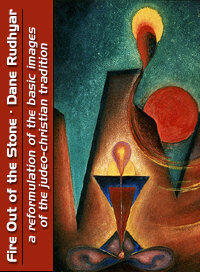 |
| Home | Bio | Art | Music | Literature | Civilization & Culture | Philosophy of Wholeness | Theosophy & Spirituality | Astrology |

FIRE OUT OF THE STONE A Reformulation of the Basic Images of the Judeo-Christian Tradition by Dane Rudhyar, 1962 1. Not to Repeat, But to Renew 2. The Essence and the Substance 3. To Become "More-Than-Man" • Page 1 • Page 2 • Page 3 4. The Fatherhood of God 5. At the Center is Soul 6. Creation and Evolution 7. Crisis and Sin 8. The Coming-Together of God and Man 9. Christ-Love: The Covenant with Individual 10. The Life of Mediation and its Paradox
: : :
This title was first published by Sevire, 1963. Cover for the online edition copyright © 2008 by Michael R. Meyer. : : : : : :
"Thy God is a cosumming fire." Duet. 4:25 "He shall baptize you with the Holy Spirit and with fire." Matthew 3:11 "I am come to send fire on the earth." Luke 12:49
: : :
|

3. TO BECOME "MORE-THAN-MAN" - page 3"And another said, Lord, I will follow thee; but let me
first go bid them farewell, which are at home at my
house.
And Jesus said unto him, No man, having put his hand to the plow, and looking back, is fit for the kingdom of God." Luke 9 : 61, 62 Jesus' life was a poem of courage and inner steadiness; an example of responsibility assumed and discharged to the bitterest end. It remains forever a protest against the "normality" of religious shams and easy, often all too easy, social adjustments. Jesus did not tell his followers that they should be happy and socially adjusted man, that they should study techniques and intellectual skills of their day and become normal according to the collective standards of their tribal society. They were told to respect the Law and the Prophets so as to give offense to no one; they were told to render to Caesar what belonged to Ceasar, for the same reason. But Jesus demanded of his disciples above all else that they leave behind all family and tribal attachments, all that belonged to the "tribal order" which binds to the blind compulsions of "life" lived as an end in itself, all hypocritical virtues and outer show of respectability or devotion. He sent them into the world asking of them that they trust in nothing but God; that they rely entirely upon the spontaneous flow of the spirit when confronted with problems and adversaries. The contagious radiance of love was to be their only armor. They were to have no security, no set pattern of dogmas, only the power of their faith and of the vividness of their own experience. "Take no thought how or what ye shall speak; for it shall be given you in that same hour what ye shall speak. For it is not ye that speak, but the spirit of your Father which speaketh in you". (Matt. 10 : 19-20). We have heard these words of Jesus again and again. But words such as these have very little weight today among the men who educate children, try to cure the sick, police city streets, or sit at executives' desks and in governmental councils, here or abroad. Modern man's essential attitude toward the creative forces of the universe, however one wishes to define or picture these, is altogether different from, and indeed antagonistic to, that held by Jesus. The picture of the successful and normal individual, mass-produced, worshipful of intellect, science and techniques, bound by second-hand opinions or controlled by economic or political expediency, by the search for security and sexual gratification, is certainly not the picture that Jesus today would want to see impressed upon our new generations. Yet this is the picture that is being impressed — the Churches assenting, more or less reluctantly. There is no room for creativeness in such a type of individual. There is even no real spontaneity and personal positiveness. The emotional responses to life of our youth and of most supposedly mature grown-ups are based on a passive acceptance of standards and fashions established by the movies, by radio and TV, by the magazines and their advertisers. How are these standards established? These various social instrumentalities and their owners are controlled in their policies by the urge to make ever more money by always producing more. This leads in most cases to a definite lowering of collective values and standards so as to reach the "lowest common denominator" of human interests or passions. But no one protests very seriously. In the name of literal freedom and in the fear of establishing precedents for "thought-control", the process of lowering of values goes on. Whatever brakes some religious or cultural groups try to apply to it take the form of completely illogical and inconsistent appeals for "decency" or "preservation of morals". These appeals affect only the least important aspects of the problem. They never reach, or even have any real desire of reaching, the basic cause of the social, cultural, religious problems which stare us in the face. Our society is reaching a state of acute crisis because, instead of placing our trust and faith in creative values and in a direct, spontaneous relationship with the creative spirit, we have come to rely almost exclusively upon our intellect, its analyses and "know-how", and upon machines and the productive ability of machines. We are facing a crisis because we have lost the more natural and spontaneous expressions of sharing in a love that is vibrant and deep, even if personal and strictly human. We are afraid of love, as we are afraid of God; we dare not speak of either, lest we be thought silly and old-fashioned. And we are afraid of any crisis, because we have lost a clear or convincing sense of what inner metamorphosis and rebirth could mean, so thorough has been the modern "debunking" of all ancient and steady spiritual ideals and religious models! We have to regain the belief in our ability to become more-than-men. We have to become aflame with a new emotion of purposefulness, a new urge to be Christ-like and to transform society by, first of all, transforming our inner selves and our taken-for-granted sense of value and purpose. All our efforts at transforming the environment of man, from the outside and by the intellect and its products, have brought us to a precipice or landed us in a vicious circle. We are being overcome by the shadow-side of our greatest and most prized achievements. The one basic cause is, I must repeat, that we have betrayed both the creative power within, the God within, and the love that Christ came to release into the world. We have lost creative vision, and so the "people perish". We seek to be "bigger and better" men, spread out over more space and "fatter" from having absorbed all we could grab for ourselves, rather than determining, with courage, emotional positiveness and will, to become more-than-men. And we dare not trust in love. Our collective need is great indeed. Only individuals can solve it who are ready to stand alone; individuals who are ready, willingly and consciously, to assume the responsibilities facing any creative person through whom spirit acts as a ray of light and, if need be, fire; individuals ready to be an oasis of inner peace and a spontaneous outflow of love in the desert of dry intellectuality and social compromise. The task is awesome; but if it is not attempted, our civilization will be increasingly deviated from its original and true purpose and destiny. It will probably defeat its enemies outwardly, sooner or later; but it will be defeated inwardly, whenever its values and its ideals collapse into meaninglessness and futility, as did those of the Greco-Roman society. When man becomes hypnotized by the problem of how to keep the circumference of his personality or society intact, strong and superficially adorned, he gradually loses the realization of, and even faith in the power at the center. In his worship of an extroverted normality and of externalized social and economic success, man comes to deny that which can only be found at the core of personality (the divine creative Self) and of society (the divine release of vision and power that has ensouled his civilization). Such a worship is the very root of "materialism"; and there might be no recovery from this blight, this "sin against the Holy Ghost" — against the creative spirit, which it is man's essential destiny to bring to an effective focus on this earth. Yet I, for one, believe it is not too late. A radical cure is possible. Healing forces are at work even in the midst of our mounting national and international crises. Not in spite of the crises, but because of them. A total crisis means, either death, or spiritual victory and rebirth. A total crisis can mean a total "catharsis" — release, dissolution, then reintegration. Reintegration demands a new focus for integration. Essentially there is only one basic focus for integration: a new Image of God, and of man in relation to God. This new Image is modern man's greatest need.  Home | About | Calendar | Ephemeris Charts | Art Gallery | Library | Resources Shop | Rudhyar Archival Project | Help Web design and all data, text and graphics appearing on this site are protected by US and International Copyright and are not to be reproduced, distributed, circulated, offered for sale, or given away, in any form, by any means, electronic or conventional. See Notices for full copyright statement and conditions of use. Web design copyright © 2000-2004 by Michael R. Meyer. All Rights Reserved. |